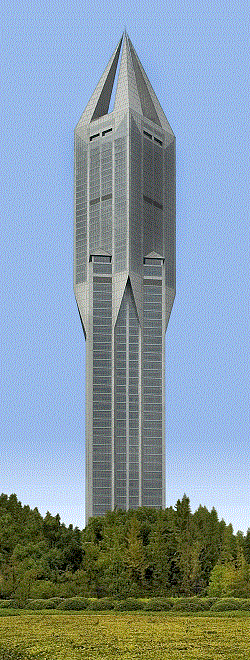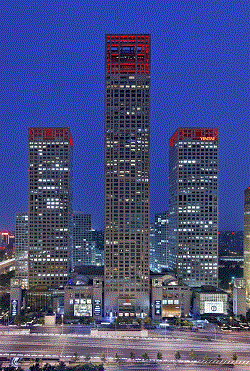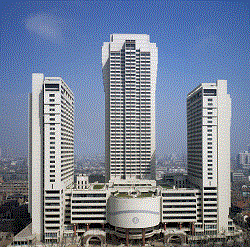CHINA The architecture firm is marking its 30th year in China, which is being celebrated with an exhibit at the Shanghai Urban Planning Exhibition Center. So what are the biggest changes that John C. “Jack” Portman III, CEO of John Portman & Associates, vice chairman, Portman Holdings, has seen in his three decades in the country? He ponders the question in this essay for HOTELS.
China is very, very large

Contemplating the question, one can’t help but focus on the words “biggest” and “change.” With one-third of the world’s population, China is big! The Chinese people think big, too, creating on a sometimes unimaginable scale. This ability to financially and to physically produce prodigious hotel environments sets the stage for new categories of opportunity. By the year 2015, an estimated 60% of China’s population will live in cities. Luxury full-service hotels have been booming in China for the past decade. This market segment is near saturation in first-tier cities and overwhelmed in some developed commercial and resort regions. However, China plans to have 50 more cities the size of Shanghai in the future. It’s difficult to fathom, yet the numbers speak for themselves.
“Change” has been the other operative word in China in recent history. Deng Xiao Ping once predicted, “When our thousands of Chinese students abroad return home, you will see how China will transform itself.” China’s gambit has paid off considerably well. Those young, Western-educated Chinese about which Deng Xiao Ping prophesied are shaping the country. They’re a very energetic and pragmatic group. Hotels need to conform to their needs and aspirations.
Understanding human responses critical

In China, like the rest of the world, architecture should be more than just the design of a building. It should be about the creation of a place for people, of space that consciously uplifts a person through an enhancement of the human condition. Understanding human values and the human response to space, nature and light allows for the development of projects that transcend national borders by striving for universal human appeal. Even after 30 years of working in China, our philosophy is the same.
Adapting Western experience to the Chinese culture can produce beautiful hybrid offspring. China has steadily molded and modified the Western hotel model. The process has taught the foreign hotel companies new and exciting ways of viewing the business. The standard 3-, 4-, 5-, and 5-star-plus hotel formulas have been injected with a flare for motif and service. The resulting process is healthy and productive. The Asian experience will certainly benefit the worldwide hotel business.
Watching and learning from Western companies and business models, the Chinese have absorbed the hotel business. They have used their new-found knowledge to foster numerous Chinese-owned hotel brands that span the quality and service spectrum. These new marks are infusing competition that promotes creativity, ultimately paving a path for future innovation. The Chinese are typically eager to incorporate their culture, by design and by service. Quite often the cultural commitment becomes an instilled abstract, a purposeful fusion reflecting international lifestyles while creating novel experiences.
Mixed-use opportunities

The Chinese urban density model frequently groups complementary functions into “mixed-use” projects, or within singular yet closely-related buildings. Hotels are often part of mixed-use projects and are, therefore, required to work well with neighboring functions. This gives the hotel company the opportunity to invest in the real estate or focus strictly on a management contract. Our experience has shown us that the deeper the risk, the potentially greater the reward.
There will always be a place for traditional 5-star hotels that offer an all encompassing first class experience. Yet, the trends are revamping tradition. Like the Virgin Group reinvented the airline business, hotel companies are gravitating toward focusing on specific sectors of users. Many of China’s trend-setting hotels will better the business model’s efficiency—lavish food and beverage offerings may be relinquished in lieu of energetic and entertaining business clubs, and vast hotel lobbies may give way to fast, free WiFi lounges. Catering to the user always makes prudent business sense.

Limited-service brands for the business traveler such as Courtyard by Marriott, Four Points by Sheraton, and Holiday Inn enjoyed significant higher occupancies and RevPAR than industry average. There will be further strong demand for business hotels designed for business travelers, both in the limited-service and full-service sectors, as China continues to become a destination for international business, and as it grow its own internal business travel sector.
Hotel companies interested in China need to follow corporate and international standards. Specific room sizes and proportions, outdoor pools and athletic facilities, ample business center facilities, and South-facing entries are just some examples representative of the physical constraints placed on Chinese hotel design. Given the long lists of requirements, it’s often difficult to use existing structures to house new hotels. That’s why, within China, new construction is the predominate approach.
Currently, competition is fierce and formidable from both international and Chinese hotel brands and owners. The market comes first as market assessment and positioning is vital. Hotel development and design should follow the market demands and be based on practical perspectives. In-depth analysis on the return rate of an investment should be carried out to determine the functions and components of a potential hotel. Targeted markets/customers and their needs, wants and demands must be fulfilled to ensure the successful and satisfactory performance of any hotel.
At the end of the day, business in China is all about relationships—knowing who you’re doing business with and understanding the market. We immerse ourselves in the culture, constantly striving to appreciate and embrace the lifestyle, research the competition, understand and respect our customer, make a robust commitment and, above all, enjoy the adventure.
